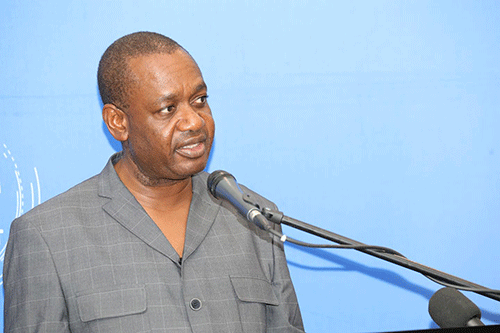In a bid to bolster the country’s Information and Communication Technology (ICT) landscape, information minister Peya Mushelenga has revealed a series of pertinent projects undertaken by the ministry.
These initiatives are poised to shape the nation’s digital infrastructure and contribute to its overall development. These initiatives, encompassing legislation, policies, strategies and national pride, signify a pivotal step forward in Namibia’s journey towards digital transformation.
In his address, Mushelenga underscored the government’s commitment to enhancing operational efficiency and effectiveness.
He announced a pivotal shift in the country’s communication strategy, aligning it with the foundations of the country’s national development frameworks.
This strategic move is in tandem with the recently approved Government Communication Strategy for the years 2022 to 2027. “Chairpersons of the various government Cabinet clusters have been engaged to proactively organise themselves and use the government information centre to communicate pertinent information to the public on key decisions and plans made in respect of government projects and the implementation thereof,” Mushelenga said.
The process started yesterday, and he said it will improve the dissemination of information on government projects, programmes and activities for the benefit of all.
Mushelenga also outlined a series of other projects, aimed at transforming the nation’s digital landscape. According to Mushelenga, the Cybercrime Bill is being redrafted, accompanied by the Cybersecurity Policy and Legislative Framework, which will undergo public consultations.
Additionally, the Data Protection Bill has been redrafted, while the amendments to the Communications Act are underway.
He said consultations and modifications have been made to the Bill; however, due to the volume of the proposed amendments, it is suggested that the Act be repealed and replaced.
The National Broadband Policy is already in motion – and with support from the International Telecommunication Union, the ministry will consolidate national ICT policies, further advancing the country’s digital infrastructure.
Strategies and guidelines
Namibia’s commitment to cybersecurity is evidenced by the implementation of the National Cybersecurity Strategy and the establishment of the National Cyber Security Incident Response Team.
These measures are integral to countering cyber threats and ensuring a secure digital environment.
“With support from the Deutsche Gesellschaft für Internationale Zusammenarbeit, the ministry is developing the National Digital Strategy and its Implementation Action Plan, which will guide Namibia’s digital transformation journey,” explained Mushelenga.
In addition to the cybersecurity measures, the ministry is also working towards the establishment of the Electronic Information Systems Management, digital literacy and the development of digital skills.
Technical assistance from organisations like UNDP and the Estonian government is propelling Namibia forward on its digital journey. Other initiatives include improved communication, whereby government communications officers have been equipped with skills in access to information, speech writing, public speaking and social media usage. “In order to accelerate the dissemination of information to the public, it was critical to establish a government Twitter page, where all OMAS share information on their programmes, projects and activities, whilst keeping their social media platforms,” the minister further explained.
With a two-year strategic plan aligned with the government communication strategy,
the ministry is poised for dynamic growth.
“This plan is largely aligned with the provisions of the GCS, pending projects from the Harambee Prosperity Plan II, as well as general ICT sector demands and expectations. The ministry is looking into aligning its current structure with the new strategic plan,” added Mushelenga.


